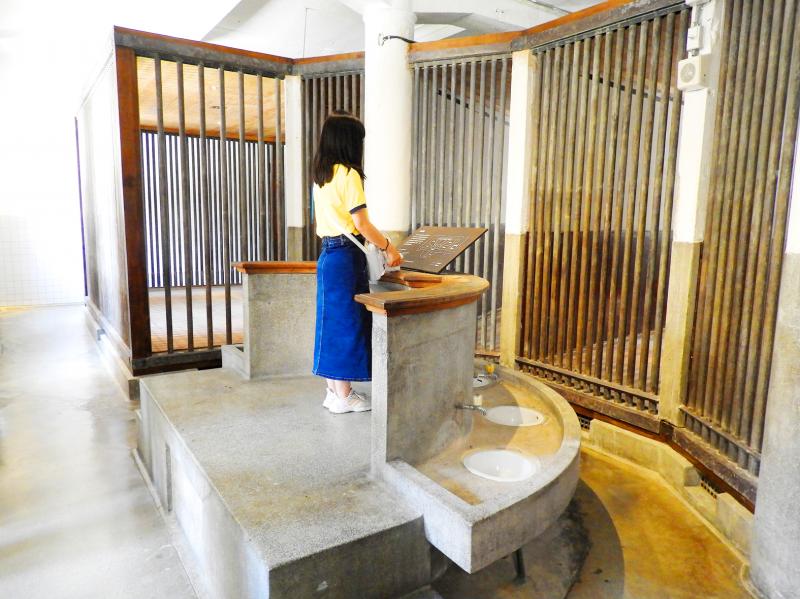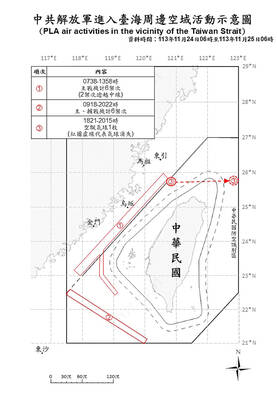The Transitional Justice Commission yesterday took members of the public on a guided tour of sites where political prisoners were held and tortured during the White Terror era.
Among the sites visited was a facility where the government used to torture political prisoners to extract confessions from them.
In the 1950s, the Ministry of Justice’s Investigation Bureau established a detention center in Taipei’s Dalongdong District (大龍峒) near the district’s Baoan Temple (保安宮), the commission said, adding that the original site has been converted into a residential building.

Photo: Chen Yu-fu, Taipei Times
Chang Wei-hsiu (張維修), who researches historical sites related to the Martial Law period, said that records related to the Dalongdong detention center were destroyed, and researchers have had to rely on testimonies from victims for much of the information they have about the site, including its location.
The Investigation Bureau appeared to have chosen the site of the facility — a one-story building — because of its location at the fringe of the city, he said.
Later the bureau established a larger facility on Xinyi District’s (信義) Wuxing Street, and then subsequently the even larger Ankang Guesthouse (安康接待室) detention center in New Taipei City’s Sindian District (新店), he said.
The former Counterintelligence Bureau — known more commonly as the “secrecy bureau” (保密局) — established a separate facility at 46 Yining St in Taipei’s Datong District (大同), where today there is a residential complex, he said.
The site was originally the location of the Koo family’s Kaosha Iron Foundry Co, but was confiscated by the Chinese Nationalist Party (KMT) government after it accused foundry owner Koo Yen Pi-hsia (辜顏碧霞) of funding communist revolutionary and novelist Lu Ho-jo (呂赫若). Only a small portion of the site remains today.
Another detention center at 28 Liangzhou St in Taipei was later demolished and replaced with a parking lot.
In 1919, the site had been confiscated from a private owner by the Japanese government, turned into a hospital and, after the KMT arrived in Taiwan, was taken over as the headquarters of the military police.
Numerous people were executed there by the military police after the 228 Incident, Chang said.
From the 1960s to 1991 the building was used by the now-defunct Planning and Research Commission for Reconquering the Mainland, after which the property was handed over to First Commercial Bank, which demolished it, he said.
The most intact site remaining from the White Terror era is the Taiwan New Cultural Movement Memorial Hall, which formerly served as the site of the police headquarters during the Japanese colonial era, and as a police office after the KMT’s arrival, he said.

A decision to describe a Chinese Ministry of Foreign Affairs statement on Singapore’s Taiwan policy as “erroneous” was made because the city-state has its own “one China policy” and has not followed Beijing’s “one China principle,” Deputy Minister of Foreign Affairs Tien Chung-kwang (田中光) said yesterday. It has been a longstanding practice for the People’s Republic of China (PRC) to speak on other countries’ behalf concerning Taiwan, Tien said. The latest example was a statement issued by the PRC after a meeting between Singaporean Prime Minister Lawrence Wong (黃循財) and Chinese President Xi Jinping (習近平) on the sidelines of the APEC summit

Taiwan’s passport ranked 34th in the world, with access to 141 visa-free destinations, according to the latest update to the Henley Passport Index released today. The index put together by Henley & Partners ranks 199 passports globally based on the number of destinations holders can access without a visa out of 227, and is updated monthly. The 141 visa-free destinations for Taiwanese passport holders are a slight decrease from last year, when holders had access to 145 destinations. Botswana and Columbia are among the countries that have recently ended visa-free status for Taiwanese after “bowing to pressure from the Chinese government,” the Ministry

HEALTHCARE: Following a 2022 Constitutional Court ruling, Taiwanese traveling overseas for six months would no longer be able to suspend their insurance Measures allowing people to suspend National Health Insurance (NHI) services if they plan to leave the country for six months would be abolished starting Dec. 23, NHIA Director-General Shih Chung-liang (石崇良) said yesterday. The decision followed the Constitutional Court’s ruling in 2022 that the regulation was unconstitutional and that it would invalidate the regulation automatically unless the NHIA amended it to conform with the Constitution. The agency would amend the regulations to remove the articles and sections that allow the suspension of NHI services, and also introduce provisional clauses for those who suspended their NHI services before Dec. 23, Shih said. According to

‘GRAY ZONE’ TACTICS: China continues to build up its military capacity while regularly deploying jets and warships around Taiwan, with the latest balloon spotted on Sunday The US is drawing up contingency plans for military deployments in Japan and the Philippines in case of a Taiwan emergency, Japan’s Kyodo news agency reported. They would be incorporated in a first joint operation plan to be formulated in December, Kyodo reported late on Sunday, citing sources familiar with Japan-US relations. A US Marine Corps regiment that possesses High Mobility Artillery Rocket Systems — a light multiple rocket launcher — would be deployed along the Nansei Island chain stretching from Kyushu to Yonaguni near Taiwan, Kyodo said. According to US military guidelines for dispatching marines in small formations to several locations,